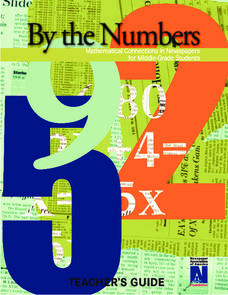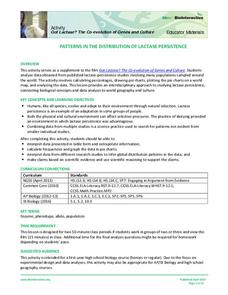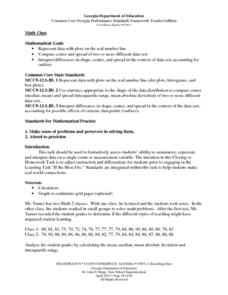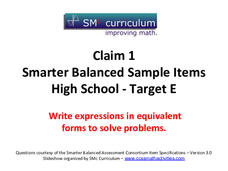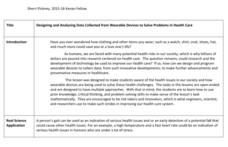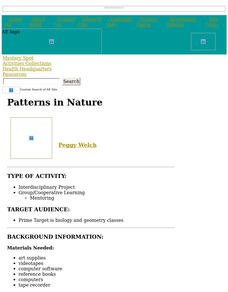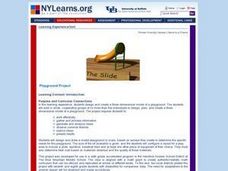Mathematics Assessment Project
Representing 3-D Objects in 2-D
How does the shape of the surface of water in a container change as water leaks out? After tackling this question, learners take part in a similar activity with more complex figures.
Virginia Department of Education
Transformations
The coordinate plane is a popular place! Identify rotations, reflections, and dilations on the coordinate plane. Pupils work in small groups to match transformations of a figure with the description of the transformation....
Newspaper Association of America
By the Numbers: Mathematical Connections in Newspapers for Middle-Grade Students
A cross-curricular resource teaches and reinforces mathematical concepts with several activities that use parts of a newspaper. Scholars use scavenger hunts to find the different ways math is used in the paper along with using data...
Centers for Disease Control and Prevention
Major Disparities in Adult Cigarette Smoking Exist Among and Within Racial and Ethnic Groups
Data indicates that some racial groups smoke more than others, and that with that racial group, there are smaller groups whose smoking habits vary as well. Secondary learners read a graph that details the differences between the Asian...
Cornell University
Garden Math
Young scientists must put their math caps on and figure out what fraction of each flower is in a raised flower bed. They must problem solve to simplify the fractions, and then graph the amount of flowers that are in different flower beds.
Math Solutions
Dr. Seuss Comes to Middle School Math Class
If you think Dr. Seuss has no place in a math classroom, then take a look at this resource. Based on the classic children's book Green Eggs and Ham, this sequence of activities engages children learning to model real-world contexts...
Balanced Assessment
Greater, Lesser, In-Between
Goldilocks and the Three Numbers? The pre-activity task involves finding digits to complete decimals or fractions that satisfy given constraints, such as finding a fractions that is in between two others. The main task involves a similar...
Howard Hughes Medical Institute
Patterns in the Distribution of Lactase Persistence
We all drink milk as babies, so why can't we all drink it as adults? Examine the trend in lactase production on the world-wide scale as science scholars analyze and interpret data. Groups create pie charts from the data, place them on a...
Georgia Department of Education
Math Class
Young analysts use real (provided) data from a class's test scores to practice using statistical tools. Not only do learners calculate measures of center and spread (including mean, median, deviation, and IQ range), but...
EngageNY
Sampling Variability in the Sample Mean (part 1)
How accurate is data collected from a sample? Learners answer this question using a simulation to model data collected from a sample population. They analyze the data to understand the variability in the results.
CCSS Math Activities
Smarter Balanced Sample Items: 8th Grade Math – Claim 4
A math model is a good model. A slide show presents 10 sample items on modeling and data analysis. Items from Smarter Balanced illustrate different ways that Claim 4 may be assessed on the 8th grade math assessment. The presentation is...
EngageNY
Sampling Variability in the Sample Proportion (part 1)
Increase your sample and increase your accuracy! Scholars complete an activity that compares sample size to variability in results. Learners realize that the greater the sample size, the smaller the range in the distribution of sample...
EngageNY
Sampling Variability in the Sample Proportion (part 2)
Increase your sample and increase your accuracy! Scholars complete an activity that compares sample size to variability in results. Learners realize that the greater the sample size, the smaller the range in the distribution of sample...
Curated OER
Patterns in the Multiplication Table
Explore patterns in the multiplication table in order to deepen your third graders' understanding of this essential skill. Implement this activity as a whole-class lesson, allowing students to work in pairs or small groups to support...
Illustrative Mathematics
How Many Containers in One Cup / Cups in One Container?
The object is to model fraction division by asking “How many are in one group?” It is a difficult concept to understand, but developing the model that shows one cup to a certain amount of container or one container to a certain amount of...
EngageNY
Coordinates of Points in Space
Combine vectors and matrices to describe transformations in space. Class members create visual representations of the addition of ordered pairs to discover the resulting parallelogram. They also examine the graphical representation...
Concord Consortium
In Oz We Tryst
The shortest distance from point A to point B is a straight line, but measuring distance gets more complicated when there are three points! Given the location of three friends, individuals determine the best point for all three friends...
CCSS Math Activities
Smarter Balanced Sample Items: High School Math – Target E
Pupils rewrite expressions in equivalent forms to identify key features. They use the vertex and factored forms of quadratic expressions to identify the extrema and intercepts. To finish the installment of the Claim 1 Item Slide Show...
Illustrative Mathematics
Money in the Piggy Bank
It's time to crack open that piggy bank and see what's inside. First, count up the pennies, nickels, dimes, and quarters, identifying what fraction of them are dimes. Then calculate the total value of the coins, writing another fraction...
Mathed Up!
Angles in Triangles and Quadrilaterals
This short video show viewers how to connect the sum of the angles in a triangle to other angle measurements. Pupils determine the missing measures for angles involved with triangles and quadrilaterals. Class members then must explain...
Kenan Fellows
Designing and Analyzing Data Collected from Wearable Devices to Solve Problems in Health Care
Wearable devices have become more the norm than the exception. Learners analyze data from a sample device with a regression analysis in a helpful hands-on lesson. Their focus is to determine if there is a connection between temperature...
Odyssey of the Mind
Odyssey of the Mind Curriculum Activity: Made Up Math
Is there a way to connect creative thinking, logical reasoning, mathematical understanding, and humor? You bet there is! Kids begin by creating creative math quizzes, which require creative thinking to solve. For example, 1+1=24, one...
Curated OER
Patterns in Nature
Research patterns in nature which illustrate biological and mathematical concepts. Your class will discover and explore aspects of fractals, Fibonaccis numbers, whale and butterfly migration patterns, whale identification, flower...
Curated OER
Math: Designing a Playground
Sixth graders design and draw a model playground to scale. They configure the layout to include a sandbox, slide, baseball field and other equipment. Their design includes adaptations for students with disabilities. Their designs are...




